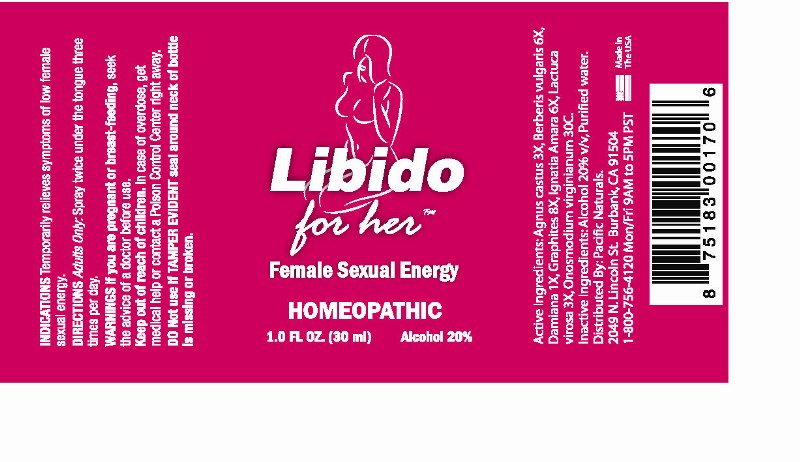Libido For Her while Breastfeeding

What is Libido For Her used for?
Is Libido For Her usage safe while breastfeeding? If a lactating mother is using it can there be any effect on growth or development of infant?

Libido For Her Breastfeeding Analsys
Chaste tree while Breastfeeding
UnsafeCAS Number: 91722-47-3
Ripe fruits are used. It contains heterosidic iridoid, estrogen-like flavonoids, terpenes and linoleic acid. Although traditionally used as a galactagogue, it contains diterpenes that have a dopamine-like effect which is inhibitory of prolactin release and milk production. Indications approved by the Commission E of the German Ministry of Health are: Irregularity of menses, pre-menstrual syndrome, mastodinia.
Berberis vulgaris root bark while Breastfeeding
DangerousCAS Number: 84649-92-3
Roots and bark are used. It contains Berberine that may be a cause of gastritis, nephritis, phototoxicity and severe jaundice by displacement of albumin -linked bilirubin: higher risk of kernicterus to newborns, which is greater in cases of 6-Glucose-PD deficiency. It is popularly widely used, however, its effectiveness has not been shown. Use not approved by the Commission E of German Ministry of Health. It should be avoided.
Strychnos ignatii seed while Breastfeeding
DangerousCAS Number: 8046-97-7
Dried seed of this plant has been used. It contains brucine and strychnine. It is highly toxic and easily lethal.
Libido For Her Breastfeeding Analsys - 2
Chaste tree while Breastfeeding
CAS Number: 91722-47-3
Chasteberry (Vitex agnus-castus) is the fruit (berries) from the chaste tree. The berries contain essential oils (e.g., limonene, sabinene, 1,8-cineole [eucalyptol]), iridoid glycosides (e.g., agnoside, aucubin), diterpines (e.g., vitexilactone, rotundifuran), and flavonoids (e.g., apigenin, castican, orientin, isovitexin). Chasteberry is often used for irregularities of the menstrual cycle, infertility, premenstrual complaints, and cyclical breast pain.[1][2] Some constituents, possibly the diterpene clerodadienols, bind to dopamine D2 receptors in the pituitary.[3] In low doses, chasteberry increases serum prolactin and it is a purported galactogogue;[4][5][6] however, no scientifically valid clinical trials support this use and galactogogues should never replace evaluation and counseling on modifiable factors that affect milk production.[7] Some evidence indicates that high doses of chasteberry decrease serum prolactin and might decrease lactation.[8] It has been used to decrease breastmilk oversupply in Persian traditional medicine.[9] In general, chasteberry is well tolerated. The most frequent adverse events are nausea, headache, gastrointestinal disturbances, menstrual disorders, acne, pruritus, and erythematous rash; however, all are mild and reversible. Among 352 nursing mothers given chasteberry tincture, 15 cases of pruritus, exanthema, urticaria, and some cases of early menstrual period occurred. Because of concerning safety data and possible lactation suppression, chasteberry should be avoided during lactation.[10] Dietary supplements do not require extensive pre-marketing approval from the U.S. Food and Drug Administration. Manufacturers are responsible to ensure the safety, but do not need to the safety and effectiveness of dietary supplements before they are marketed. Dietary supplements may contain multiple ingredients, and differences are often found between labeled and actual ingredients or their amounts. A manufacturer may contract with an independent organization to verify the quality of a product or its ingredients, but that does certify the safety or effectiveness of a product. Because of the above issues, clinical testing results on one product may not be applicable to other products. More detailed information #about dietary supplements# is available elsewhere on the LactMed Web site.
What should I do if already breastfed my kid after using Libido For Her?
Due to high dilution of ingredients in homeopathic medicines they do not create much problem for baby. Libido For Her is a homeopathic medicine and if your baby does not have any abnormal symptoms then there is nothing to worry about. Be careful with too much usage of ethanol based homeopathic medicines during breastfeeding.
I am nursing mother and my doctor has suggested me to use Libido For Her, is it safe?
Homeopathic medicines are usually safe in breastfeeding and if Libido For Her has been recommended by doctor then there should be no concern about its usage in breastfeeding.
If I am using Libido For Her, will my baby need extra monitoring?
Not exactly.
Who can I talk to if I have questions about usage of Libido For Her in breastfeeding?
US
National Womens Health and Breastfeeding Helpline: 800-994-9662 (TDD 888-220-5446) 9 a.m. and 6 p.m. ET, Monday through Friday
UK
National Breastfeeding Helpline: 0300-100-0212 9.30am to 9.30pm, daily
Association of Breastfeeding Mothers: 0300-330-5453
La Leche League: 0345-120-2918
The Breastfeeding Network supporter line in Bengali and Sylheti: 0300-456-2421
National Childbirth Trust (NCT): 0300-330-0700
Australia
National Breastfeeding Helpline: 1800-686-268 24 hours a day, 7 days a week
Canada
Telehealth Ontario for breastfeeding: 1-866-797-0000 24 hours a day, 7 days a week
